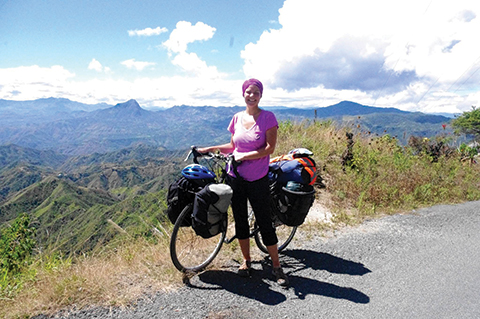U of T alumna Ali Burke (MSW 2009) spoke to Stacey Gibson, midway through Burke’s amazing, 27,000-kilometre trip.
Why did you decide to take this journey?
About four years ago I was growing weary of my 9 to 5 lifestyle, and I started asking myself if this is all there is to life: a good job, a pension, and a few weeks vacation. My answer was a resounding ‘no’, and I began day dreaming about other possibilities. Travelling and cycling make a wonderful combination. The slow pace, the exercise, the countless opportunities to see places and meet people that you would otherwise just pass on by – these are just some of the joys. There is also an addictive sense of accomplishment! So I decided that before it was too late I wanted to do a really big ride. My partner and I picked the longest road that exists: the Panamerican highway.
What do you hope to take away from the trip?
At the risk of sounding very cliché, I will say that this trip is not really about the destination at all. The personal growth is all in the journey. I feel I am learning excellent problem solving skills: from not having a place to sleep to bicycle tires exploding hundreds of kilometres from any town, we need to figure out solutions. Another hope is that I will have reasonable Spanish skills by the end of the journey; we have not taken any formal lessons but have picked up a lot of the language already. Finally, it took a lot of courage to quit my secure job and hit the road. With each kilometre we travel I gain more self-confidence – it is that great lesson in working away at something and seeing it happen.
You are riding to raise money for the Canadian Mental Health Association – why did you choose this particular organization?
I have spent almost all of my career in the field of mental health, and my hope was that in raising money for the CMHA we could not only help an excellent organization provide services to those in need, but also take on the stigma that is all too often associated with mental health difficulties.
Have you had any injuries?
Early on, in the Yukon, my partner Glenn had a fall and landed on his knee. We had to hitch a ride to Whitehorse and Glenn was unable to walk for about a week. This was quite stressful because we weren’t sure if we would be able to carry on at all, but thankfully he has fully recovered! I have had a few crashes, the most serious leaving me with only scrapes and bruises. Probably more frustrating, I have had parasites a couple of times. The symptom is simply fatigue, and when you are riding your bike every day you are tired anyway, so it is hard to sort out if it is because of the parasites or the riding. I have now learned to get tested and medicate early, and this makes a big difference.
How many hours a day do you bike? Do you ride in inclement weather, too?
Generally we ride anywhere from five to nine hours a day, although there have been times when we have been on the road close to 12 hours, and other days when we get to where we wanted to be in just two hours. Head winds and big climbs can slow us down to a snail’s pace – while the opposite can make us feel like machines! We have the gear to ride in all sorts of weather conditions, and we have been known to bike through the odd torrential downpour or hailstorm. Strangely, I kind of like riding in the rain, it is very refreshing.
Where do you stay each night?
We have slept all over the place. In the US and Canada we would almost always find a place hidden in the forest to set up our camp. However, when we reached Mexico we were advised not to do this. We would ask at ‘Ranchos’ or even mechanic shops if we could camp on their property and we were always given a spot as well as access to a bathroom.
We stayed in our first fire station in Panama. We asked them if the forested area would be OK to camp in and they said they didn’t know but that we were welcome to camp on their lawn. That night they made us dinner, gave us a couple of papayas, and told us about the next fire station we could stay at. We have discovered that in Central and South America fire stations, or bomberos, have a tradition of taking in cyclists.
Do you feel safe?
We do. We do take precautions, such as not riding at night and camping with permission, but most of the time it feels like people are looking out for us. Although as a women I am sometimes victim to catcalls and such, we have not had one item stolen or even any semblance of someone trying to rob us- and we have pedalled through some pretty rough neighbourhoods. I like to think there are far more good people in the world than bad, so statistically our chances of running into the not-so-good folks is pretty low.
What is it about cycling that you love?
For me, biking has always been about freedom and independence. There is something so simple about travelling by bicycle – yet it can take you so far! Towards the end of high school I began imagining exploring the world in this way, and somehow this translated to hopping on a plane to Ghana and travelling overland to Europe by bicycle. I was totally unprepared, and in fact was robbed on my first day of cycling, but this was an isolated incident and what I remember more than anything is the kindness and hospitality of those I met along the way. From this point on, I was hooked on bicycle travel!






